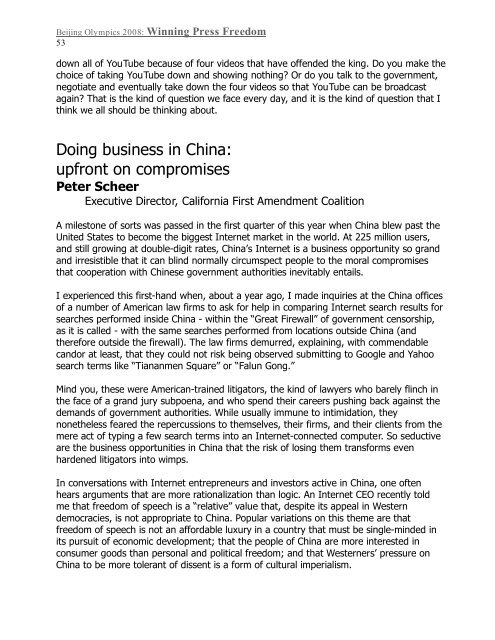Beijing Olympics 2008: Winning Press Freedom - World Press ...
Beijing Olympics 2008: Winning Press Freedom - World Press ...
Beijing Olympics 2008: Winning Press Freedom - World Press ...
Create successful ePaper yourself
Turn your PDF publications into a flip-book with our unique Google optimized e-Paper software.
<strong>Beijing</strong> <strong>Olympics</strong> <strong>2008</strong>: <strong>Winning</strong> <strong>Press</strong> <strong>Freedom</strong><br />
53<br />
down all of YouTube because of four videos that have offended the king. Do you make the<br />
choice of taking YouTube down and showing nothing? Or do you talk to the government,<br />
negotiate and eventually take down the four videos so that YouTube can be broadcast<br />
again? That is the kind of question we face every day, and it is the kind of question that I<br />
think we all should be thinking about.<br />
Doing business in China:<br />
upfront on compromises<br />
Peter Scheer<br />
Executive Director, California First Amendment Coalition<br />
A milestone of sorts was passed in the first quarter of this year when China blew past the<br />
United States to become the biggest Internet market in the world. At 225 million users,<br />
and still growing at double-digit rates, China’s Internet is a business opportunity so grand<br />
and irresistible that it can blind normally circumspect people to the moral compromises<br />
that cooperation with Chinese government authorities inevitably entails.<br />
I experienced this first-hand when, about a year ago, I made inquiries at the China offices<br />
of a number of American law firms to ask for help in comparing Internet search results for<br />
searches performed inside China - within the “Great Firewall” of government censorship,<br />
as it is called - with the same searches performed from locations outside China (and<br />
therefore outside the firewall). The law firms demurred, explaining, with commendable<br />
candor at least, that they could not risk being observed submitting to Google and Yahoo<br />
search terms like “Tiananmen Square” or “Falun Gong.”<br />
Mind you, these were American-trained litigators, the kind of lawyers who barely flinch in<br />
the face of a grand jury subpoena, and who spend their careers pushing back against the<br />
demands of government authorities. While usually immune to intimidation, they<br />
nonetheless feared the repercussions to themselves, their firms, and their clients from the<br />
mere act of typing a few search terms into an Internet-connected computer. So seductive<br />
are the business opportunities in China that the risk of losing them transforms even<br />
hardened litigators into wimps.<br />
In conversations with Internet entrepreneurs and investors active in China, one often<br />
hears arguments that are more rationalization than logic. An Internet CEO recently told<br />
me that freedom of speech is a “relative” value that, despite its appeal in Western<br />
democracies, is not appropriate to China. Popular variations on this theme are that<br />
freedom of speech is not an affordable luxury in a country that must be single-minded in<br />
its pursuit of economic development; that the people of China are more interested in<br />
consumer goods than personal and political freedom; and that Westerners’ pressure on<br />
China to be more tolerant of dissent is a form of cultural imperialism.





